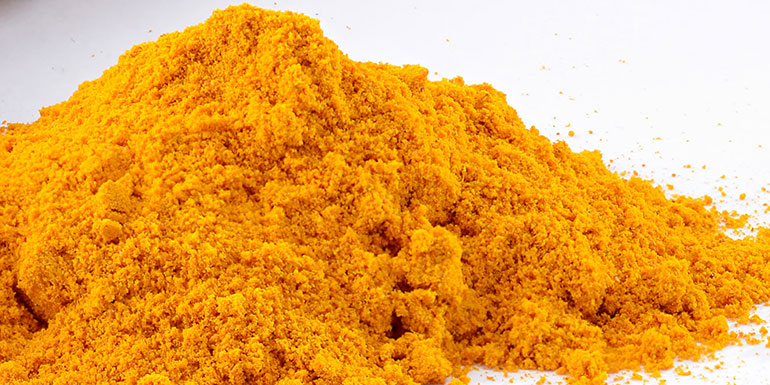Scroll to Recipes with Turmeric Powder / हल्दी पाउडर as ingredient
Turmeric powder is the principal ingredient in Indian and Middle East cuisine. It is also termed as “Golden Spice”, “Indian Saffron” or “Wonder Spice”.
The use of turmeric is in the form of rhizome (the underground part of the plant) as well as the powder to impart a golden yellow color. It is used in products like canned beverages, baked products, dairy products, ice cream, yogurt, yellow cakes, orange juice, biscuits, popcorn color, cereals, sauces, and gelatin.
Commonly known in India as …
In North India, turmeric is commonly called “Haldi,” a word derived from the Sanskrit word haridra.
Whereas South Indians recognize it as “manjal,” a word that frequently arrives in ancient Tamil literature.
There are many different names for Turmeric.
The name turmeric derives from the Latin word terra merita (meritorious earth), referring to the color of ground turmeric, which resembles a mineral pigment. French also calls it terre merite.
In many languages, people simply refer to it as “yellow root”. Many cultures name is based on the Latin word Curcuma.
In Sanskrit alone, turmeric has at least 53 different names, including Bhadra (auspicious or lucky), Gauri (to make fair), Haldi (that draws attention to its bright color), Haridra (dear to hari, Lord Krishna), Jayanti (one that wins over diseases), Jawarantika (which cures fevers), Kaveri (harlot), Nishakhya (known as night), Pavitra (holy), Shifa (fibrous root), Soubhagaya (lucky), Vairagi (who remains free from desires), Vishagni (killer of poison), etc.
| Language | Name | Written as |
|---|---|---|
| Arabic | Alkarkam,Uqdah safra | الكركم,عقدة الصفرا |
| Bengali | Halud | হলুদ |
| English | Indian saffron | |
| Gujarati | Halad, Haldar | હળદર |
| Hindi | Haldi | हल्दी |
| Kannada | Arishina, Arisina | ಅರಿಶಿನ |
| Malayalam | Manjal | மஞ்சள் |
| Marathi | Halad | हळद |
| Punjabi | Haldi | ਹਲਦੀ |
| Sanskrit | Mangalya, Haldi | मङ्गल्या, हलदी |
| Tamil | Manjal | மஞ்சள் |
| Telugu | Haridra, Pasupu | అసియాటికా, పసుపు |
| Urdu | Haldi, Zard chub | ہلدی, زرد چوب |
Here is a table containing all the names for turmeric across the globe.
Nutritional Profile of Turmeric Powder
Nutritional profile per 100 gms
- Calories: 354
- Protein: 7.8g
- Carbohydrate: 64.9g
- Fiber: 21.1g
- Fat: 9.9g
- Sodium: 38mg
- Potassium: 170mg
Source: USDA & Google
Forms of Turmeric
Rhizome
The base form of turmeric used is its underground part that is rhizomes as it imparts the golden yellow color.
Curcumin
Another important form of turmeric is Curcumin which is the compound in the roots of the plant. Turmeric is derived from the plant Curcuma Longa containing curcumin. Most of the recognized benefits of turmeric are gain from this part.
Turmeric Spice
As we all know, turmeric was and still primarily used in cuisines for its flavor. Turmeric pairs with almost every food group, be it vegetables, curry, sweets, beverages, and the list goes on.
Turmeric Pills
For those who want a large intake of this ingredient but doesn’t want to directly eating or drinking it, or are even sensitive to spices. These pills and capsules are an easy solution. You just need to swallow it.
Benefits of Eating Turmeric Powder
Turmeric holds importance as a medicinal component in Southeast Asia and not just in spices. Modern medicine too has recognized its importance.
Over 3000 publications dealing with turmeric, that came out within the last 25 years supports the facts. It is a major part of Ayurveda, Siddha medicine, traditional Chinese medicine, Unani, and the animistic rituals of Austronesian peoples.
There is a litany for the diseases in which people use turmeric to cure. The benefits of this herb are limitless.
Anti-Inflammatory
Several studies state this fact that turmeric is anti-inflammatory. You might have witnessed old people applying turmeric in paste form on burns.
Source: ncbi.nlm.nih.gov
Pain Reliever
Studies prove that turmeric is also used to get relief from pain. Turmeric Capsule consumed by the people suffering from Arthritis had been relieved from the pain. It worked as great as Advil or Ibuprofen for them.
Source: ncbi.nlm.nih.gov
Help Reduces the Risk of Cancer
Cancer disease is characterized by uncontrolled cell growth. Turmeric can contribute to the death of cancerous cells according to the studies.
Source: ncbi.nlm.nih.gov
Anti-Oxidant
Oxidants are the particles that are responsible for the rapid aging of the body and also behind many diseases. Turmeric is a potential anti-oxidant as it neutralizes the effects of these oxidants.
Source: ncbi.nlm.nih.gov
Lower Brain Diseases
Brain-derived neurotrophic factor is a type of growth hormone which functions in your brain and is responsible for its growth. Decreased level of these hormones causes many brains infused diseases like Alzheimers and Depression. Interestingly, turmeric helps in increasing this hormone.
Source: sciencedirect.com
Lowering of Heart Disease
Heart disease is the major cause of death, and many factors contribute to its occurrence. Turmeric or curcumin helps reverse many steps responsible for heart disease. Curcumin reduces inflammation and oxidation, which play a role in heart disease as well.
Source: ncbi.nlm.nih.gov
Anti-Aging
Oxidation and inflammation play a role in aging. And since turmeric possesses qualities to be an anti-oxidant and anti-inflammatory, it helps prevent early aging.
Source: ncbi.nlm.nih.gov
Side Effects of Consuming Turmeric in Large Quantity
Turmeric contains oxalate-a components which if consumed in large quantities, increases the risk of stone in the kidney. Moreover, not all turmeric powder available in the market is pure. They may be adulterated with harmful unlisted ingredients.
One should also consider that some turmeric powder may also contain harmful food colorants to make it look more eye-pleasing and yellow in color. On top of that, some turmeric powders may also be high in lead, a heavy metal that is especially toxic to the nervous system.
Turmeric also helps in reducing the fat and cholesterol in blood but it can be dangerous if consumed in more dosage than advised. Some studies have indicated that people have experienced mild digestive issues if the daily doses exceed 1,000 mg.
Frequently Asked Questions about Turmeric
Here’s an answer to some commonly asked questions by people about turmeric.
What is the health benefit of Turmeric?
Curcumin, the most active compound in turmeric beholds the most scientifically proven medical benefits. According to the studies conducted, turmeric has the potential to prevent heart diseases, Alzheimers and cancer. It possesses the quality of being Anti-Oxidant and Anti-Inflammatory which helps with symptoms of depression and Arthritis.
Is Turmeric bad for kidneys?
Turmeric contains an oxidant-a component that is responsible for binding minerals in the body. One may risk with kidney stone problem if you consume it more than the recommended amount.
How much turmeric should you take a day?
Depending upon the purpose of the intake, the quantity of turmeric varies. In general, 500 to 2000 milligrams of dosage is recommendable. If you want anti-inflammatory effects than 500-1000 milligrams should be consumed, which is close to 0.175 tsp to 0.702 tsp.
What medicines should not be taken with turmeric?
Turmeric is capable of the thining of blood in our system. So a person who is on medication like warfarin (Coumadin), clopidogrel (Plavix), and aspirin should not consume it as it may make the effects of these drugs stronger. Turmeric shouldn’t be taken with the drugs that reduce stomach acids because it can interfere with the process. Still, please consult a doctor for the same.
Can turmeric help you lose weight?
Turmeric has many health benefits but consuming it in more amounts will not help you in losing weight. Although, it reduces the inflammation caused due to obesity, so it may boost up your weight loss plan.
Does turmeric stain your teeth?
Even though turmeric does stain things easily, there is a little risk of it staining your teeth. Just make sure you are not allergic to it and are using it for times recommended per day.
What are the negative effects of turmeric?
It usually does not have side effects but people may experience stomach upset, nausea, dizziness, or diarrhea.
Does Turmeric Lower Cholesterol?
The limited studies done on lipids or fats in our body shows that turmeric is beneficial in reducing cholesterol. While it slightly lowers cholesterol in your body, the levels of reduction may not be significant.
Is turmeric good for arthritis?
Curcumin- the key compound of turmeric is claimed to be a pain reliever for people suffering from Arthritis. It worked as great as Advil or Ibuprofen for them.
Can turmeric stain your skin?
Yes. Turmeric can give your skin a bright yellowish color. The color may leave with some soap and warm water but it will take some time and scrubbing.
Can turmeric raise blood pressure?
High doses of turmeric can lower blood sugar or blood pressure which means that people taking medicines for diabetes and high blood pressure should be cautious.
Can turmeric cause gas and bloating?
People may experience digestive problems and diarrhea if the dosage exceeded than required.
Is turmeric good for the liver?
Yes. Due to the strong antioxidant effect of turmeric, it may stop the toxins from damaging the liver.
Is turmeric good for gout?
It can help reduce the inflammation related to gout.
Is turmeric good for back pain?
Inflammatory pathways trigger swelling and pain in your body. Curcumin blocks those pathways and acts as an anti-inflammatory.
Can turmeric be effective in Arthritis?
Rheumatoid Arthritis is a long-term autoimmune condition that causes inflammation, pain, and stiffness in the joints. Some research suggests that the spice turmeric may help relieve the inflammatory symptoms of this condition
Is turmeric good for hair?
The antiseptic and anti-inflammatory qualities it possesses can help with the dry and itchy skin of the scalp or with dandruff.
Can ginger and turmeric be taken together?
The two ingredients work well together in salad dressings, stir-fries, and sauces to add a surge of flavor and health benefits to your favorite recipes. Pairing turmeric with black pepper is more ideal usually.
Is turmeric good for thyroid?
Curcumin, the most active ingredient in turmeric, has anti-inflammatory, antioxidant, antibacterial, and antiviral activity, all of which can provide benefits to those suffering from Thyroid-related symptoms.


